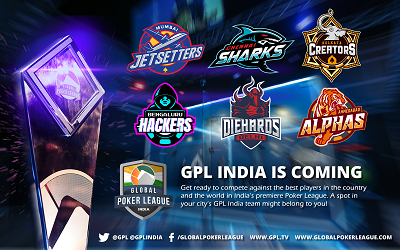
If having an international poker league (albeit seemingly defunct right now) and another poker league in the country with the largest population in the world (China) wasn’t enough, Mediarex S&E has gone full bore into another critical poker battleground.
Mediarex S&E, the ownership behind the international Global Poker League and the GPL China, has announced the formation of another poker league, this time in the burgeoning market of India. The GPL India will be a six-team league that will look to extend the reach of one of the most dominant players in the poker industry into a country of a billion-plus people. It also looks to enter a battleground where there are already organizations that have gotten the jump on Mediarex in that nation.
“The GPL India will…create the most legitimate – and perhaps more importantly most appealing – poker competition witnessed in India until now,” Mediarex founder and Chief Executive Officer Alexandre Dreyfus wrote in announcing the new league. “This is a spectacle built to benefit the country’s poker enthusiasts and draw in fans as well. Top players from India’s national GPI rankings will be a part of this league – but while the pros will have their place, the nation’s millions-strong contingent of amateur players and poker lovers will have the opportunity to win their way into a roster spot on their local GPL India teams as well.”
Six teams will make up the GPL India – the Delhi Diehards, the Mumbai Jetsetters, the Bengaluru Hackers, the Chennai Sharks, the Kolkata Creators, and the Ahmedabad Alphas – with a combination of professional and online players making up the teams. The inaugural season will see the eventual champion of the GPL India join other international teams in a proposed World Championship setting. With that said, there are issues that have arisen that make poker fans wonder just what is going on with the GPL.
Since the close of the inaugural season of the GPL International in late 2016, there has been the announcement of the GPL China and, now, the GPL India. While there are teams that have been named for both nation-specific leagues, neither has actually begun play. This is especially interesting in that China was announced in December 2016; nearly nine months later, no play has begun in the GPL China, although there have been competitions to pick teams for nearly all of the franchises prior to their start on September 9.
Then there is the issue of the GPL already entering into a market that has two other team poker leagues in existence. The Indian Poker League and the Poker Sports League have both exploded on the scene, with the PSL actually having a season under their belt. The IPL has joined forces with the International Federation of Poker (IFP) to play under their unique “Match Poker” format (where identical hands are played simultaneously and points are given for how well the players played the hands).
One thing that both leagues have is financial backing. The 12 teams in the PSL are all owned by prominent businesspeople in India, giving it credibility in the area. The eight team IPL has followed in the footsteps of the PSL, enlisting different businessmen and companies (and even poker professional Aditya Agarwal and his brother, Praveen) as “owners” of the teams. The GPL India and Dreyfus mention that they are following in the mode of the international GPL in that it will not have individual team owners but go with a “single league” philosophy that eschews singular business interests and goes for stakeholders’ ownership in the league overall to grow the organization. Unlike the PSL and the IPL, who have announced the ownership behind all their teams and the businesses they represent, these GPL stakeholders have never been announced in any of the GPL creations.
Has Dreyfus and Mediarex been caught on the short end of the stick with two organizations raiding a huge marketplace before their GPL organization even got off the ground? Or do they believe that the overall “name recognition” of the GPL – and the Global Poker Index, the internationally recognized ranking standard of poker excellence – can overcome coming late to the game and/or delaying the starts (or restarts) of their different leagues? The coming months could be the determining factor of which version of “team poker” will survive.























